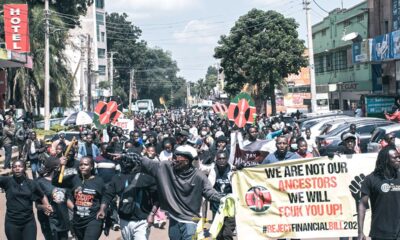The Entrepreneur
David Karangu: Ex-Wealthiest Kenyan in US Plans Business Comeback
David Karangu worked 12 hours a day, six days a week, meaning the guy did not have time for a social life. This leads one to ask whether hard work alone is the panacea for business success.
“A good plan comes first.” The love of your work is secondary; you would do it for fun. “Hard work follows along with a little luck,” he says.
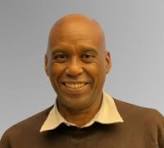
:Once America’s Wealthiest Kenyan, Quietly Ventures into Real Estate in Malindi as He Eyes a Grand Business Comeback in Kenya. Can He Recreate His Past Success?
By Charles Wachira
At age 30, David Karangu became a dollar millionaire, joining 5.3 million affluent households, comprising 1.9% of the population, in the world’s largest economy with a net worth of $1 million or more.
The year was 1997—the place, Augusta, Georgia.
Ten years later, after earning his millionaire stripes, Karangu sensationally retired from his daily grind, selling his entire business to revel in his next earthly adventure of globetrotting and building luxury homes.
Since relocating to Kenya in 2022, Karangu has engaged disparate professionals involved in his nascent businesses on particular days of the week.With each group seemingly allocated time to engage with him, demonstrating a time management skill on his part that replicates a military regiment.
And should an interlocutor be running late, Karangu calls them to inform them a meeting has begun:What they do with that information is up to them.
Arguably, Karangu’s time discipline evokes Carl Sandburg‘s observation, that states : “The common man does not concern himself with time; it propels the talented man forward.”
Currently, he’s involved in some real estate projects in Malindi, where he has purchased significant land.For now , that’s all he’s willing to share about his present exploits, opting to court anonymity with a vengeance.
But your correspondent is not done with him yet. He reminds him of the Biblical parable of talents and assures him that he, who lives in the firmament, is undoubtedly proud of his earthly achievements to date and, therefore, he should not be modest.
But he does not budge.
One of Karangu’s properties in the US was described as “ a smart home version of a European castle.”
What are some of his thoughts about business?
“ Where most business people make a mistake is when they become too attached to a business,” says Karangu, whose judgement, influencing him to call it a day at age 40, led the Columbia Business School to write a white paper sponsored by the US Government called “The Owner’s Journey”.
The paper interviewed eight successful US entrepreneurs, including Karangu, who nurtured and grew businesses but unwittingly struggled with cognitive dissonance as their accustomed adrenaline-driven lifestyle got upended.
It features their firsthand accounts of shared experiences, lessons learned, and reflections on what they might have done differently.
Then,as the days and nights unfolded, paving the way for a fresh year and then another and another, Karangu, according to the papers’ account, raised the white flag. An unquenchable desire for the business he first fell in love with at 18 years old, namely running a car dealership, seductively strangled his pulmonary veins.
He badly needed to breathe again.
Let’s take a deep dive into Karangu’s involvement with the US.
It turns out Karangu, once associated with the 26th largest minority-owned car dealership in the U.S. according to the Black Enterprise Magazine (BEM) – was at the time raking in annual sales surpassing $100 million.
With his involvement with the US traceable to his father, Dr. Mwangi Karangu, a beneficiary of the Kennedy Airlifts who ended up being an egghead at Morgan State University.
But in 1972, after a 12-year hiatus, the old man and his fledgling family relocated back to Kenya, marking the first time the younger Karangu, born in the U.S. in ‘67, would set foot in the motherland.
However, Karangu’s visit to his forebearer’s homeland was short-lived.
In 1983, the older Karangu and his brood relocated to the U.S. upon accepting a teaching job, once again at Morgan State University. With the political uncertainty submerging Kenya then widely thought to have prompted the move.
You see,in 1982, two unsavoury events occurred in Sub-Saharan Africa’s fourth-biggest economy, including an attempted coup and the abrogation of plural democracy. These duo acts gradually smothered the bloodline of a functional democracy, precipitating a palpable sense of edginess in the national psyche.
From then on, Kenya seemed to be barreling towards an aberration of what the Roman goddess Libertas symbolises in the iconic Statue of Liberty found in the Big Apple.
The foreboding atmosphere in Kenya must have stirred the lecturer and his family to relocate to the US.
The Washington Post nicely captured the mood engulfing this East Africa state at the time, reporting that “Since he came to power in 1978,( President) Moi has weathered a reported assassination plot, a bloody Air Force coup attempt, a sharp drop in Kenya’s economy, and, by his own recent account, the recognition of “evil-minded people” in his government who are holdovers from( President) Kenyatta’s days in power.”
Additionally, the Paper reported that by holding parliamentary elections in 1983, a year before the scheduled time, Moi had advanced the argument that it was “in order to clean the system.”
He further advised Kenya’s 7.2 million registered voters that it would serve their best interests if they elected MP’s who closely identified with him and reject contestants thought to be “disloyal” to him.
In 1983, the world also witnessed several seminal events happening.
That year, the first-ever portable mobile phone was unveiled, and the U.S. invaded the Caribbean Island nation of Grenada, while Zimbabwe witnessed the beginning of a civil war.It was apparent that parts of the world were in a capricious mode.
It was also a watershed year for this East African state as national elections were taking place.
Many recognise that Moi explicitly called for the 1983 elections to address a severe political crisis that arose after Moi labelled Charles Njonjo, a powerful politician at the time, a traitor, dismissed him from the cabinet, and expelled him from the ruling party KANU.
Two reasons led to this decision.
First, Moi hoped that the elections would legitimise the presidency and restore confidence following the abortive coup on August 1, 1982.
Two, the elections were used to focus public attention away from the serious economic problems that the country was facing, says Dr. Ahluwalia Davinder Pal Singh, a political scientist.
And for a person whose worldview had been shaped by the thinking behind a coterie reverently referred to as an Assembly of Demigods, it was arguable that Dr. Karangu’s fidelity to the second paragraph of the United States Declaration of Independence was sacrosanct.
Indeed, it can be said, Kenya of the 80s and 90s exhibited a predatory, retaliatory, and uncharitable character, particularly towards adherents of libertarianism but also towards that anonymous man on a Kenyan street who dared believe in the doctrine of all persons having inalienable rights.
Young Karangu takes over from here.
“I got started when I was 17 years old. That’s when I relocated back to the US from Kenya. People who knew me then in Baltimore will tell you I used to say, ‘I will be a millionaire before I’m 30 years old.’ And they would say, ‘That Karangu kid is crazy.’ But this is something I badly wanted to become more than anything else,” says Karangu, 58, “the first personal quality one needs to have to achieve success in business or any other sphere of life is ambition.”
According to the Entrepreneur magazine “Self-belief is the foundation of success.”
This assertion is widely considered an ironclad rule.For undoubtedly, no one ever achieved unreasonable success without maintaining a strong belief in themselves. Self-belief must ultimately align with the specific field in which one aims to triumph.
“Nobody reaches a target without defining it and believing –sometimes naively and to almost universal ridicule – that it is attainable.”
In his telling, Karangu states that other qualities necessary for business success include liking people, adopting a cautious approach when hiring human capital, and possessing money management skills.
“You have to know how to hire and maintain discipline,” he emphasises. “This is a crucial skill you must possess. Interpersonal relationships are critical. For instance, how one deals with customers is essential. Another area where people often falter is in managing money.
“This is where education and going to college come in. In business, you first learn that profit and cash are two different things. If you are not managing your money correctly and there is a lot of cash tied up in inventory, you can be cash-poor, affecting many people.
“Managing money and managing people are the two biggest things that can make or break a sale,” says Karangu, born in 1967 in a U.S. hospital.
Being disciplined, says Karangu, is also an attendant quality required to succeed in business.
“One requires undivided discipline; I worked 70 to 80 hours weekly, not because I had to but because I took my business extremely seriously.”
He adds, “When it comes to business, I’m very strict; I do not hire people because they are my friends, as I have always protected my reputation and integrity,” says Karangu.
To date Karangu is probably the only Kenyan progeny to have had a calendar day named after him in the US, as evidenced by the Mayor of Augusta, Georgia, declaring July 28, 2005, “the David Karangu Day.”
The bureaucrat also awarded this entrepreneur, widely thought to have been one of the top ten business operatives in the ancestral home of the Hardest Working Man in Show Business, with an Honorary Key to the city.
The Governor of Georgia also appointed Karangu to the Board of the second-largest hospital in the State for a three-year term.
These accolades underlined Karangu’s then-unvarnished pedigree as an influential entrepreneur in the U.S.
Upon completing his undergraduate studies at Morgan State University—with degrees in accounting and marketing—his first job was as a dishwasher at a large pancake franchise, a job he considered tedious.
Initially, he had set his mind on becoming a lawyer, but gradually, his innate intuition directed him towards the sales profession.
“It was something I just sort of fell into,” says Karangu, who, on exiting the pancake franchise, got employed by the Ford Motor Company, where he stayed for eight years, ascending through the ranks.
“I discovered it was something I enjoyed,” he says.
Soon after learning the ropes, he dreamed of owning his dealership and building a nest egg.
After saying goodbye to Ford in 1995, he enrolled at the National Automobile Dealers Association Academy – a prerequisite requirement for all car dealers in the U.S.- while working as a sales manager at a Lincoln dealership in Melbourne, Florida.
Ford Motor Company owned Lincoln Motor Company and acquired the company around 1922; it’s a luxury vehicle division of Ford.
“When I started my business, I knew I wanted to do this.” I did my research and was able to provide hard numbers. I left a job paying me over $120,000 a year to start a business.
“The first year I made $40,000. This brings me to another point. You better get married to someone committed to the ups and downs of business. Imagine going from $ 120,000 to $40,000! Or moving from a nice four-bedroom house to an apartment. These are the sacrifices you have to make when you are getting started,” he says.
After he completed the course, he could do nothing but wait for the right opportunity to come along.
But after learning the ropes, he started dreaming of owning his dealership and building a nest egg for that purpose.
The thought of starting his own business didn’t worry him, but the waiting drove him crazy.
“I had always loved cars since I was a little boy.During my stint as an employee, I made up my mind that the automobile industry would be part of my future,” he told the Kenya-based Nation newspaper.
His entrepreneurial journey, which led to his present-day financial freedom, began in Augusta, Georgia.But it was anything but bliss, for he faced the ubiquitous travails faced by bootstrapper entrepreneurs.
Listen up as Karangu narrates his initial obstacles.
“ Let me walk you through.” I was working for the Ford Motor Company and was comfortable doing what I was doing. Then, I decided I wanted to go out and do something else for myself. I couldn’t think of anything at the time. But at night, I’d see all these informational commercials on TV about buying houses and becoming a millionaire. Guess what? I bought into this stuff.
“I realised that you could get rich this way. The next thing that I did was to identify the business I wanted to engage in. And I identified that I wanted to buy an automobile dealership. And I went to the people in the industry that I knew, and they turned me down. They asked me, “How old are you anyway?” I said, “ 25 years.” And they said, “Get another 15 years before we can take you seriously”
“Then I went to a bank. I will never forget when I went to SunTrust Bank with an excellent package prepared, and the guy in the bank did not even open the package. After this, I started reading biographies of wealthy people. And the one thing that stuck out was partnerships. I had 150 clients. My clients were mainly car dealers.
I thought, “Out of the 150 people, there must be someone with whom I can partner.” As I went through my day job, I would ask those I was close to, “What do you think of you and I starting a business together? “ Eventually, I ended up with a list of three people. The last person I talked to said to them, “Look at this. Give me the capital to get started.”
“I will own 51 % of the business; you do not have to do anything.” I will do all the work, and you will own 49 % he said, “What are you giving up? I will give up my house. “I will give up my 410 K plan.”
Admittedly, Karangu got his big break when a friend in Orlando told him of the opportunity at Fairway Ford , a six-acre lot off Washington Road in the booming bedroom community of Evans.
Mr. Karangu saw potential in the dealership. It was modern, in a prime traffic location, and had an upper-income customer base.
He quickly purchased it using his savings and a line of credit through Ford Motor Co., which he used to leverage a bank loan.
According to Wealthy Gorilla, entrepreneurs must make seven sacrifices to succeed in business, and Karangu clearly ticked all the boxes.
Should one be interested in pursuing a business, what advice would Karangu give to a putative entrepreneur?
Says Karangu, “There are so many businesses you can do.” But you have to narrow them down. And the best thing is always to engage in something you are familiar with. And a lack of seed capital should not be a hindrance.
“I will normally tell anybody that I started with no money. I came to the US just like anybody else. Yes, I was fortunate to have brothers and sisters, but none came to me and said, ‘Here is a batch of money; invest in a dealership.’ There is no easy career in this world. I started attending business conferences and talking to people doing what I wanted to do.
“And I heard their stories. I was also able to meet people who finance businesses, and I was able to grow that way,” says this Nyeri High School alumnus, who was ranked the 41st richest black entrepreneur in the U.S. by Black Enterprise Magazine(BEM) in 2013.
Then, on November 1, 1997, he launched his first dealership—Fairway Ford of Augusta, in Georgia—at age 30, becoming the youngest dealer of the Ford Marquee in the United States. This milestone led him to bag the Ebony Magazine 2001 Dealer of the Year award.
One may very well wonder if there is a magic bullet in business.
Hear him speak: “ If you want to be a doctor, you must attend school. You have to read and research. Often, people start a business without researching and then wonder why they failed. By research, I mean if you want to open a restaurant, you have to talk to people who own restaurants.
“Amazingly, we Kenyans are so shy about picking up the phone and going to talk to someone with specific questions. People will tell you how they became successful. Talk to people and listen to how they did it. And you will learn different things.”
In 2002, aged 35, his Atlanta-based motor dealership company, the Ivory Chevy Auto Group, was ranked among the largest minority-owned enterprises in the U.S., grossing over $100 million in sales annually—an equivalent amount to what today’s world’s largest software and programming company is spending over the next five years to open an Africa technology development centre with sites in Kenya and Nigeria.
And his appetite for motor vehicle dealerships was headed north with each passing year.
Interestingly, growing up in the motherland, he intuitively developed a passionate love for the Mercedes Benz brand, believing that cars bearing the three-pointed stars marquee were the world’s ultimate ride.
Coincidentally, on July 1, 2005, Karangu opened a Mercedes-Benz dealership, which became the crown jewel of his new empire. From the word go, it was a shoo-in, setting new records for a Mercedes dealership, as the entrepreneur emerged as one of only five African Americans in history to own one.
On July 14, 2010, he purchased the former Steve Rayman Chevrolet South dealership, the biggest in Georgia, attracting unprecedented recognition by the state government and the business community, and renamed it Ivory Chevrolet.
Then, on April 2, 2012, he purchased Sutherlin Mazda, signalling the beginning of a new chapter in the auto industry.
He went on to own a BMW dealership in Columbia, South Carolina, followed by Volkswagen and Subaru dealerships in the same state.
In 2013, Karangu, then 46, became the first African immigrant to make the coveted list published by BEM.
Over the years, the younger Karangu has been involved in philanthropic work both in the US and in Kenya, earning him, for example, the local state award of Moran of the Burning Spear (MBS) in 2012.
What does Karangu think of his storied entrepreneurial journey?
“At that time, for the last 10 years, we had made a lot of money before I decided I wanted to do something independently.” That’s when I went and bought the dealerships. Right now, banks approach me and ask if I want money, and I tell them no, recalling the times when no one would speak to me.
But it is because I did not have a proven record then. But all I will tell you is that a strong idea always prevails, even when lacking money. In my case, the idea was more powerful. Think about it—even in Kenya, when someone gets started, who gives them money?”
Maya Angelou would also echo this truism, saying, “You can only become truly accomplished at something you love.” Don’t make money your goal. Instead, pursue the things you love doing, and then do them so well that people can’t take their eyes off you.”
Karangu worked 12 hours a day, six days a week, meaning the guy did not have time for a social life. This leads one to ask whether hard work alone is the panacea for business success.
“A good plan comes first.” The love of your work is secondary; you would do it for fun. “Hard work follows along with a little luck,” he says.
Karangu, without a doubt, is a person who became a Croesus through sheer personal grit and self-belief. As a millionaire, his advice is indeed worth heeding.
His parting shot is, “Read about other successful people and surround yourself with positive people.”
Keywords:David Karangu Entrepreneurial Journey:Business Success Tips from David Karangu:US Car Dealership Industry Insights:David Karangu’s Real Estate Ventures in Kenya:Kenyan Entrepreneurs in the US
:
She Business
Bethlehem Tilahun Alemu: From Ethiopian Artisan to Global Icon

: Discover how Bethlehem Tilahun Alemu built SoleRebels into a global,
sustainable footwear brand, overcoming challenges and transforming Ethiopian
craftsmanship.
Bethlehem Tilahun Alemu’s story begins in Zenabwork, a modest village on the outskirts
of Addis Ababa, Ethiopia. Growing up, she watched her community struggle with unemployment and poverty, despite a rich heritage of artisanal skills that remained largely untapped.
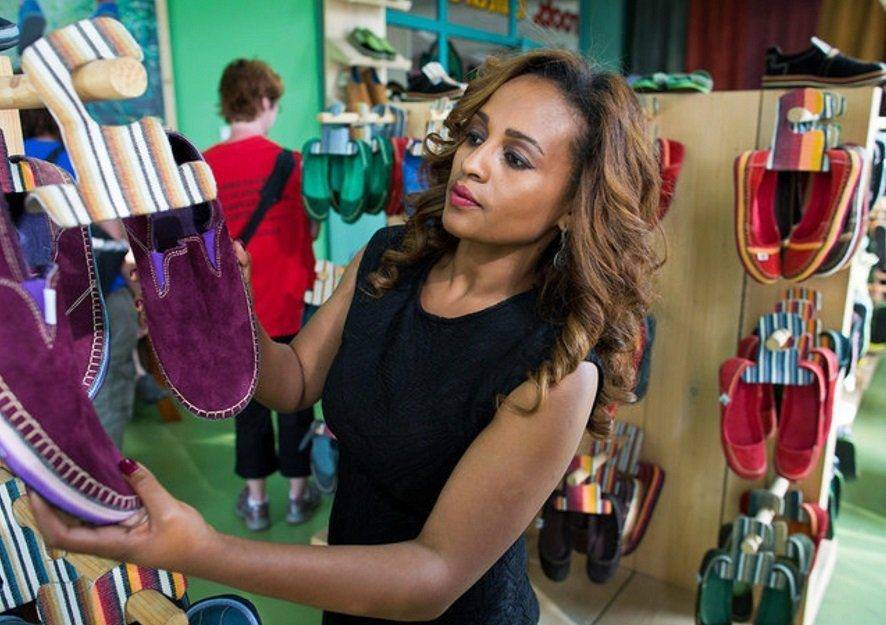
Fueled by determination and a desire to transform her surroundings, Bethlehem
embarked on a journey that would redefine African entrepreneurship and put Ethiopia
on the global map.
Her creation, SoleRebels, isn’t just a footwear brand. It’s a movement—an embodiment
of sustainability, culture, and empowerment.
A DREAM WOVEN WITH TRADITION
In 2005, Bethlehem founded SoleRebels with a simple yet powerful idea: to turn
Ethiopia’s rich artisanal craftsmanship into eco-friendly, globally competitive footwear.
Inspired by traditional “selate” shoes—made from recycled tyres—she envisioned a
brand that blended cultural authenticity with modern design.
She recruited local artisans, many of whom were unemployed, and encouraged them to
innovate while preserving traditional techniques.
Every pair of shoes was a masterpiece, crafted from hand-spun cotton, organic
materials, and repurposed car tyres. Bethlehem’s concept was groundbreaking: a product that told a story while making a global impact.
STARTING FROM SCRATCH
Like many entrepreneurs, Bethlehem’s initial challenge was capital.
With no access to bank loans or large investors, she relied on personal savings and
modest contributions from her family.
Slowly but surely, she built her business, reinvesting profits into training workers and
improving production tools. International grants and initiatives like the SEED Initiative later recognized the potential of her venture, providing additional support.

The early days weren’t easy. Artisans lacked modern tools, and accessing raw
materials was an uphill battle. But Bethlehem, known for her tenacity, tackled these challenges head-on. She developed partnerships with local suppliers to ensure a consistent supply of quality materials and invested in upskilling her workforce.
Breaking into the global market presented another hurdle. Competing against established brands seemed daunting, but Bethlehem found her edge: sustainability and ethical production.
In an era when consumers were becoming eco-conscious, SoleRebels’ ethos of fair wages, recycled materials, and cultural storytelling resonated deeply.
BUILDING A GLOBAL EMPIRE
Fast forward to today, and SoleRebels has a presence in over 30 countries, with
flagship stores in cities like San Francisco, Tokyo, and Barcelona.
It is also the first African footwear brand to be certified by the World Fair Trade
Organization (WFTO)—a testament to Bethlehem’s commitment to doing business the
right way.
Her company directly and indirectly employs over 1,200 people, making it one of
Ethiopia’s largest employers in the artisan sector.
Workers earn more than three times the industry average, a policy Bethlehem takes
immense pride in. “When we pay people well, we don’t just change lives—we transform
communities,” she says.
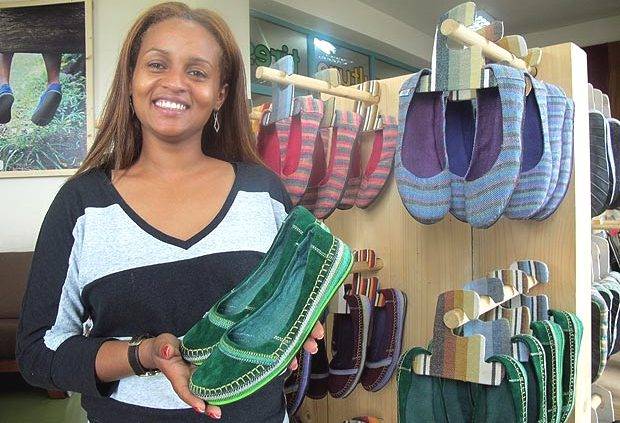
MENTORS AND INSPIRATIONS
Bethlehem often credits her late grandfather, a farmer and community leader, as her
greatest mentor.
His work ethic and deep belief in the power of local communities shaped her vision. She
also draws inspiration from global leaders, including Ethiopian Prime Minister Abiy
Ahmed, whose focus on innovation and economic growth aligns with her goals.
RISING ABOVE CHALLENGES
Bethlehem’s entrepreneurial journey has been marked by resilience. When production
scaled up, she faced supply chain disruptions that threatened deadlines. Her solution?
Cultivate long-term relationships with reliable local suppliers and diversify material
sources.
Entering new markets came with its own set of obstacles. Competing against
established brands requires a unique value proposition.
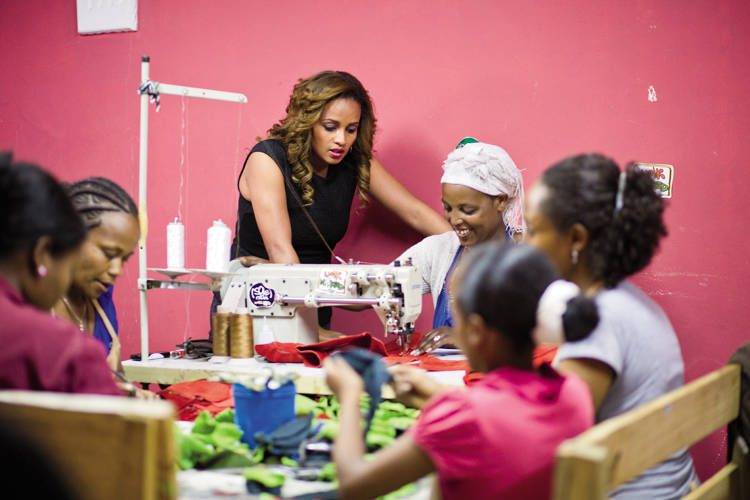
SoleRebels offered more than shoes—it offered a story: a product steeped in Ethiopian
culture, made sustainably, and crafted ethically.
VISION FOR THE FUTURE
Bethlehem isn’t slowing down. Her plans include:
- ● Expanding SoleRebels’ retail presence in Europe and Asia.
- ● Introducing sustainable clothing lines.
- ● Partnering with global brands to promote eco-friendly production in Africa.
Beyond SoleRebels, Bethlehem has a broader mission: to inspire a new narrative for
African entrepreneurship. She wants to show the world that Africa isn’t just a consumer
market but a hub for innovation and excellence.
CONCLUSION: WALKING THE TALK
Bethlehem Tilahun Alemu has redefined what it means to be an entrepreneur. From
Zenabwork’s dirt roads to the global stage, she has shown that success doesn’t come
from resources alone—it comes from vision, grit, and a deep connection to one’s roots.
With SoleRebels, Bethlehem has not only created a thriving business but a model for
how sustainable, ethical enterprises can transform communities. As she continues to
dream big, her footsteps pave the way for the next generation of African changemakers.
She Business
Joyce Akinyi Convicted: Heroin Smuggling Case Exposed

: Kenyan businesswoman Joyce Akinyi faces life imprisonment after being found
guilty of smuggling heroin worth US$ 34,483. Her history with crime has now
unravelled.
Joyce Teresia Akinyi’s story is one of dramatic highs and lows—rising from a successful
businesswoman to being convicted of a large-scale heroin smuggling operation.
With ties to international criminal networks, high-profile relationships, and repeated run-
ins with the law, Akinyi’s life has been marked by controversy and legal battles.
THE HIGH LIFE: BUSINESS AND INFLUENCE
Akinyi first gained prominence as the upscale Deep West Resort owner in Lang’ata,
Nairobi. Known for her affluent lifestyle, she mingled with Kenya’s elite and maintained
significant business interests.
However, behind the glamorous facade lay a darker world of alleged criminal activity.
Her personal life was equally turbulent. In 1998, she met Nigerian businessman Anthony Chinedu, and the couple had two children before formalising their union.
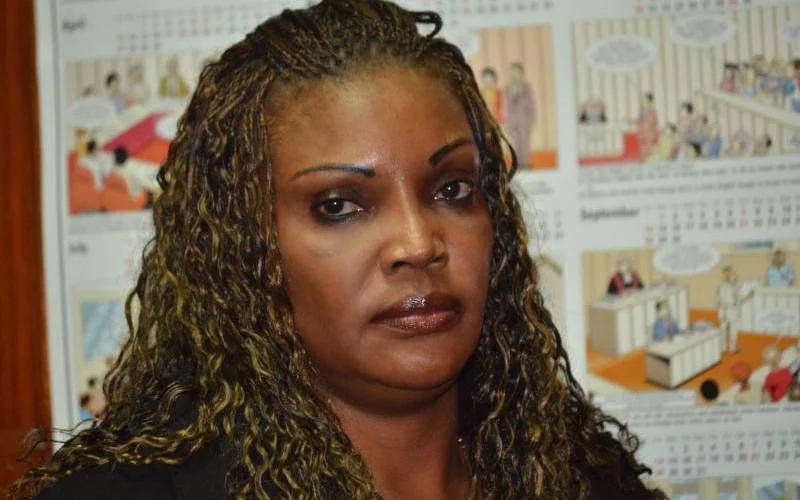
Their relationship was rocky, marked by numerous arrests on drug trafficking charges.
In 2013, Chinedu was deported from Kenya after authorities seized drugs in his
possession, a move that further exposed Akinyi to public scrutiny.
A HISTORY OF LEGAL TROUBLES
Over the years, Akinyi faced repeated allegations of drug trafficking. Her name became
prominent in 2008 when she was arrested in New Delhi, India, alongside former
Budalang’i MP Raphael Wanjala.
Authorities detained the pair with undeclared cash worth Sh7.59 million, suspected to
be linked to drug deals. Although released after intervention by the Kenyan government, the incident marked the start of a string of legal troubles for Akinyi.
In 2013, she and Wanjala were arrested again on the Nairobi-Namanga highway with a
suspicious white powder. Although they claimed it was corn flour, suspicions persisted,
and Akinyi’s criminal associations deepened.
THE TURNING POINT: CONVICTION FOR HERION SMUGGLING
Akinyi’s criminal activities reached a dramatic conclusion in 2019 when a police raid on
Deep West Resort uncovered 2kg of heroin worth Sh5 million hidden in a shoe rack.
The Anti-Narcotics Directorate linked the operation to an international smuggling
network coordinated by Akinyi.
The Jomo Kenyatta International Airport Tribunal found Akinyi guilty under Article
4(a) of the Narcotic Drugs and Psychotropic Substances Control Act, which
mandates life imprisonment for drug trafficking.
The court heard compelling evidence, including photographs of heroin wrapped in white
tape, voice recordings coordinating smuggling activities, and the discovery of a Tabita
Digital Scale used to weigh drugs.
Akinyi’s co-defendants, Paulin Kalala Musankinshay and Peres Adhiambo, were
similarly implicated. Evidence also revealed that Akinyi used multiple fake passports, including a Congolese passport in the names of “Mape Marline Kambura” and “Raha Eveline
Kambere,” enabling her to operate under different aliases.
FINANCIAL CRIMES AND ASSET RECOVERY
Beyond drug trafficking, Akinyi’s wealth came under scrutiny. In 2021, she lost two
luxury vehicles worth Sh20 million to the State, deemed proceeds of crime.
Investigations by the Asset Recovery Agency revealed that Akinyi deposited
suspiciously large sums ranging from Sh60,000 to Sh20 million into various bank
accounts. Her real estate investments—villas built and rented out—further indicated
illicit income sources.
THE END OF THE ROAD
On December 10, 2024, Akinyi faces sentencing, which could include life
imprisonment and a Sh5 million fine. Her fall from grace highlights the dangers of
unchecked ambition and illegal pursuits. Magistrate Njeri Thuku, who presided over the
case, dismissed Akinyi’s defence that the drugs were planted by her estranged husband
Chinedu, calling it baseless.
CONCLUSION
From her meteoric rise as a business mogul to her conviction as a drug trafficker, Joyce
Akinyi’s life is a cautionary tale of how power, wealth, and crime can intertwine.
Her story also underscores Kenya’s ongoing battle with drug trafficking and the far-reaching
consequences of organised crime. For Akinyi, the glitz and glamour of her former life
have now given way to the stark reality of justice.
Nb: Exchange rate 1 USD = 145 Ksh
The Entrepreneur
Miss Rwanda 2022, Divine Muheto, Faces Drink-Driving Scandal

: Miss Rwanda 2022, Divine Muheto, was arrested for drink-driving, fined, and
detained after a car crash. She expresses regret and seeks forgiveness for her
actions.
From Beauty Queen to Legal Controversy
Divine Muheto, 21, crowned Miss Rwanda 2022, rose to prominence as a symbol of
beauty and ambition. She always believed she had what it took to achieve her childhood
dream of becoming a beauty queen.
Her journey began after high school when she entered the Miss Rwanda competition,
ultimately claiming the coveted title.
Reflecting on her success, she once said, “When you fear, you can’t make anything
different in life, but when you are fearless, a lot of positive things come your way.”
Legal Troubles in 2024
However, her reign as Miss Rwanda has been overshadowed by controversy. In late
2024, Muheto was arrested following a drink-driving incident in Kigali.

Reports from the Rwanda National Police (RNP) confirmed that she was caught driving
under the influence of alcohol without a valid license, resulting in a crash that destroyed
public infrastructure, including a street light pole and palm trees.
The police also noted that Muheto fled the scene of the accident. She was subsequently
fined 190,000 Rwandan francs (approximately $140) and detained.
This incident marked a troubling pattern, as the beauty queen had previously faced
similar charges in September 2023, when she crashed her car into a building while
driving drunk.
Silent Remorse and Public Engagement
Muheto, the daughter of Assistant Commissioner of Police Francis Muheto, has
remained largely silent in the media following her arrest, though her legal team has
expressed that she deeply regrets her actions and has sought forgiveness.
Despite this, she continues to be a public figure, engaged in various activities. Her legal troubleshave raised concerns, but she remains resolute in her belief that life’s challenges present growth opportunities.

Inspirational Messages and Support System
While her parents have largely stayed out of the spotlight, Divine Muheto has continued
to inspire many young people in Rwanda, emphasising resilience and self-improvement.
She once said, “I knew I had what it takes to the last dot,” and even in the face of
adversity, she strives to move forward, learning from her mistakes and striving to make
a positive impact.
-

 Politics5 months ago
Politics5 months agoFred Okengo Matiang’i vs. President William Ruto: A 2027 Election Showdown
-

 Business & Money10 months ago
Business & Money10 months agoEquity Group Announces Kshs 15.1 Billion Dividend Amid Strong Performance
-

 Politics4 months ago
Politics4 months agoIchung’wah Faces Mt. Kenya Backlash Over Gachagua Impeachment Support
-

 Politics6 months ago
Politics6 months agoPresident Ruto’s Bold Cabinet Dismissal Sparks Hope for Change
-

 Politics7 months ago
Politics7 months agoPresident Ruto’s Lavish Spending Amid Kenya’s Economic Struggles Sparks Outrage
-

 Politics6 months ago
Politics6 months agoJohn Mbadi Takes Over Kenya’s Treasury: Challenges Ahead
-

 Business & Money2 months ago
Business & Money2 months agoMeet Kariuki Ngari: Standard Chartered Bank’s new CEO of Africa. What’s Next?
-

 Politics7 months ago
Politics7 months agoKenya Grapples with Investor Confidence Crisis Amid Tax Protest Fallout

